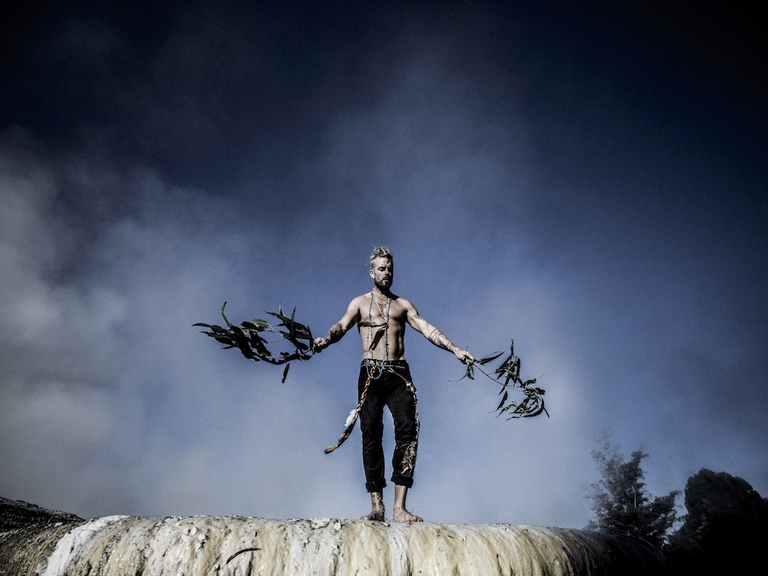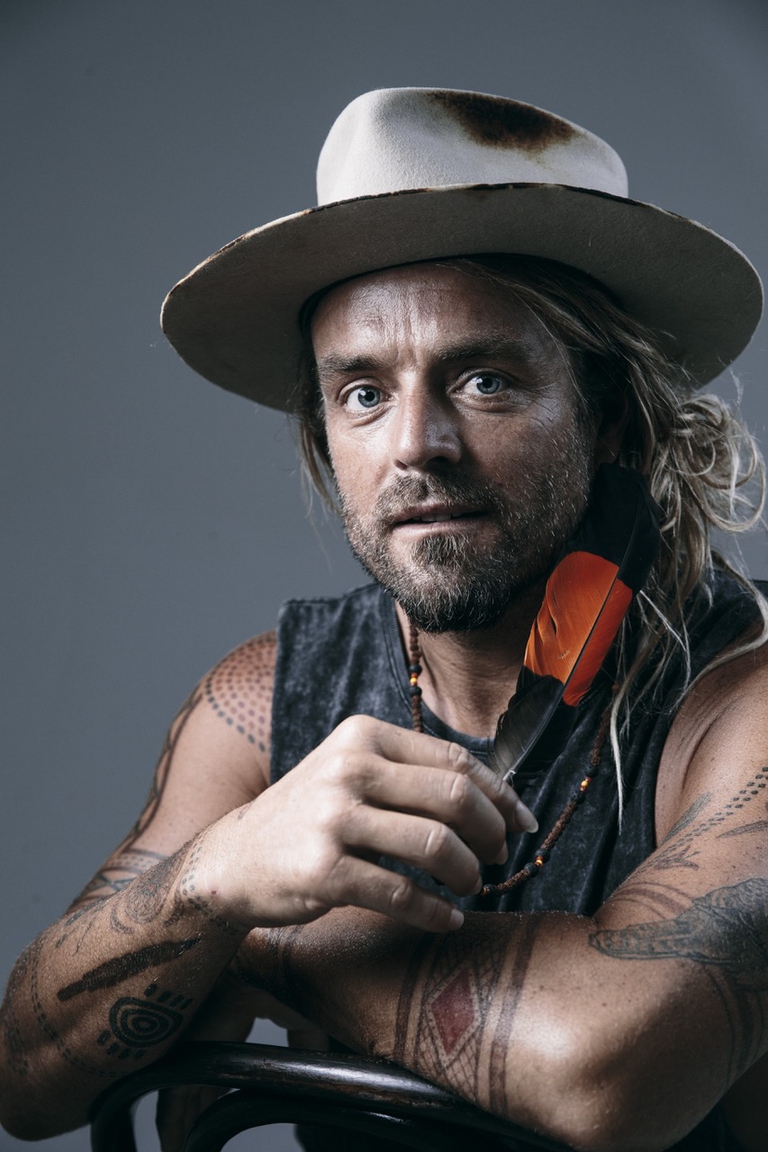
Renzo Piano’s archive in Genoa houses the great architect’s projects. It brings young people closer to creative work, which he equates to “looking into darkness without fear”.
The Australian songwriter, who became famous with Follow the Sun, is back with Walk Away, a new and powerful ode to freedom. He’s about to set off on a world tour. Our interview with Xavier Rudd.
He’s one of the most respected Australian musicians in the world, with an almost twenty-year long career. Xavier Rudd is a pure and talented artist who is continuously seeking the beauty he celebrates through his music and the poetry of his lyrics.
His arrangements space from folk to reggae, harkening back to traditional music, but his lyrics are always about protecting the environment as well as ethnic and religious minorities, especially the rights of aboriginal people, from which he descends; he tries to spread their culture and values. Xavier Rudd is considered an inspiration for all free spirits, lovers of Mother Earth and for those who embrace a simple lifestyle that is free from the restraints of Western materialism, mostly thanks to the success of Follow the Sun, the song that made him a star.
An excellent and profound songwriter whose name can be listed among the likes of Ben Harper, Jack Johnson, Eddie Vedder and his majesty Bob Marley. Religion, sustainability, equality, a positive approach to life, freedom and much more: these are the themes we discussed in the course of this interview.
How is Australia these days?
It’s very warm, it’s a fantastic season right now. I’m really lucky to live in this wonderful region of the world.
Your new album Storm Boy is about to come out. Are you excited?
We just finished recording it and I can’t wait for the album to be out, but there’s no time to dwell on it because we’ve already began rehearsals for the long tour ahead of us.
You’ve said that every album is a revelation of your spirit that magically appears through music: what has this album told you about yourself?
This album is very special to me, it’s much more personal than Nanna with the United Nations, which can be considered a separate chapter in my discography. On the other hand, Stom Boy is a natural progression from Spirit Bird, the continuation of my journey and an honest tale of my experiences in the last five years.
The first single entitled Walk Away is already out, it’s one of the most powerful and melodically incisive songs you’ve ever written. What is the message behind the lyrics?
This song is an invitation to raise your head and start over, open new doors where old ones have been closed, to follow your vibrations even though you don’t know where they’ll take you, always looking for a positive flow.
To quote your dear friend Ben Harper, sometimes you just have to walk away. In your songs it seems more like a peaceful rebellion than a defeat.
If we make radical choices, we must be certain and firm in our beliefs, always remembering to love ourselves for what we are.
Your vision shows a balance between spirituality and rationality. I know you’re not a believer, what is your relationship with religion?
I’m not religious in the sense that I don’t believe in a God and I don’t follow the tenets of organised churches, but I believe in nature and everything that surrounds me: I love Earth, the sun, the sea and animals. Music is my only church.
If the most important religions had focused their doctrines on Mother Earth instead of higher beings, do you think we’d love and respect our planet more?
I think so, those beliefs influence our daily lives, but there are also many religions that teach us to respect the gift of nature. In truth it would be enough to think of ourselves as part of planet Earth and love it for everything it gives us. We should always evolve in a positive and respectful manner, as opposed to being omnivorous and predatory.
Do you believe the beauty of the world manifests itself or that we have to continuously seek it out?
I believe beauty is everywhere: I already feel lucky to live in a magical place like Australia, but there’s beauty everywhere, we just have to look for it and concentrate on what’s closest to us. We have to put effort into looking for it even in the people around us.
Read more: Australia. 52,000 hectares of land returned to Larrakia Aboriginals
You’ve always been a spokesperson for the culture of your aboriginal ancestors. Which of their teachings would be the most useful to improve modern civilisation?
Equality, without a doubt: in aboriginal tribes, human beings are equal to plants and animals. For example, if they need water from the desert they only take what is strictly necessary and leave the rest to animals, because they respect them immensely. They don’t care about owning land, like English colonisers did here, but they feel like a living part of it.
You’ve often supported environmental causes in the last few years: what worries you most about the current situation?
The most pressing theme is climate change, the most serious. The policies brought forth by United States president Donald Trump scare me, as well as those of large multinational companies. We have to stop just talking and act quickly.
We probably don’t feel the substantial effects it is having on out daily lives yet. We still think it’ll be a problem that future generations have to face.
Most people are brought to think this way, because they believe they can’t have any kind of impact. If we want to see great changes, the decisive push must come from above, from governments and companies. We need strict rules and actions in order for the rules to be respected. In the meantime, our collective consciousness is being moved thanks to various causes, the efforts of NGOs, awareness campaigns and the battles that are being fought by important figures like Al Gore or Leonardo DiCaprio.
Let’s make a list of your three most important songs on the environment. What are they and why?
The first one would be Come Let Go, the lyrics talk about focusing on simple things, letting your mind go and abandoning material possessions, appreciating the pure pleasures offered to us by nature. Then comes Spirit Bird, probably my most powerful song: it narrates a mystical experience I had in the desert after an encounter with a cacatua, a sacred Australian bird. I’d never been so close to that animal, so I was paralysed in the sand and started having visions in my mind. I connected them to my ancestors, as if the bird had brought me a message from them, a message I transferred into the lyrics. The third is Creancient, a song I wrote in the Amazon rainforest after I took part in a ritual in the river. My face was covered in mud, then I opened my eyes, looked at the forest and the chorus’ words were immediately revealed to me: “Rise up to creation, spirit of the ancients”.
Your songs are always an inspiration to many free spirits around the world. What is your idea of freedom?
There isn’t a single concept of freedom: I think anyone can be free if they want to and if they’re sure they can rid themselves of the conditions imposed by religions and the system. The only way to consciously overcome our slavery is to know what is causing it.
Nowadays you’re always busy with long tours around the world. Do you still manage to travel for pleasure?
I try to travel even when I’m playing around the world, combining the two things. Recently, I was lucky enough to perform in Costa Rica and Hawaii, and I took a few days to visit these marvellous places. Now a beautiful tour awaits me and I can’t wait to go to Italy to play my new songs, the album is really great and you’ll like it for sure.
Your approach to life is very positive and peaceful: are you always so calm and balanced or do you lose you temper from time to time?
I’m human like everyone else, I have feelings and experience contradictions, I’m not the Dalai Lama! (He laughs, editor’s note). Everything that happens constantly tests our patience but if we focus our energy on respecting others rather than getting angry, we would all be much calmer.
Siamo anche su WhatsApp. Segui il canale ufficiale LifeGate per restare aggiornata, aggiornato sulle ultime notizie e sulle nostre attività.
![]()
Quest'opera è distribuita con Licenza Creative Commons Attribuzione - Non commerciale - Non opere derivate 4.0 Internazionale.
Renzo Piano’s archive in Genoa houses the great architect’s projects. It brings young people closer to creative work, which he equates to “looking into darkness without fear”.
The 50th anniversary of the Moon landing on 20 July has awakened the fantasy of many. Here’s the perfect playlist of musicians who have let themselves be inspired by the universe and its celestial bodies.
N’we Jinan is a Canadian record label that gives First Nations students their voice back by allowing them to create their own music in mobile recording studios.
Three teenagers from New Zealand sing in the Maori language about abuse at the hands of British colonisers. Thanks to their thrash metal music, young people are being attracted to native culture.
There’s no room for anger, resignation, or desire for revenge in this playlist. There’s just the moral obligation of retracing and telling the stories that can’t go lost and forgotten all over again. We do so through music.
Le canzoni più belle del 2017 secondo LifeGate Radio. Con questa playlist lanciamo la nostra collaborazione con Spotify Italia che vi farà ascoltare la musica migliore, selezionata.
An organisation that unites over 1,000 mainly Maya women in Guatemala has expressed alarm that indigenous handicrafts, textiles called “huipiles” in particular, are under threat because underpriced industrial fabrics appropriating indigenous patterns have flooded the Guatemalan market, depriving many native women of their main source of income. Read more: Down to Xjabelle, the fashion collection by a young designer with Down
Rwandan creatives share a common dream: they want to use their art to bring about positive change in society, as well as put their country on the map. They’re mostly young, ambitious, self-taught and have a strong desire and determination to challenge mentalities, move forward and grow. In her documentary RWANDArt: A new creative generation, which
Korogocho, Kenya, is Nairobi’s third slum. It rises on the huge mountain of trash of Dandora landfill (the capital’s biggest dumpsite) and about 200,000 people live there in tin sheds built on an area of approximately one and a half square kilometers. Unlike Muthaiga, one of Nairobi’s wealthiest areas located less than two kilometres away from









